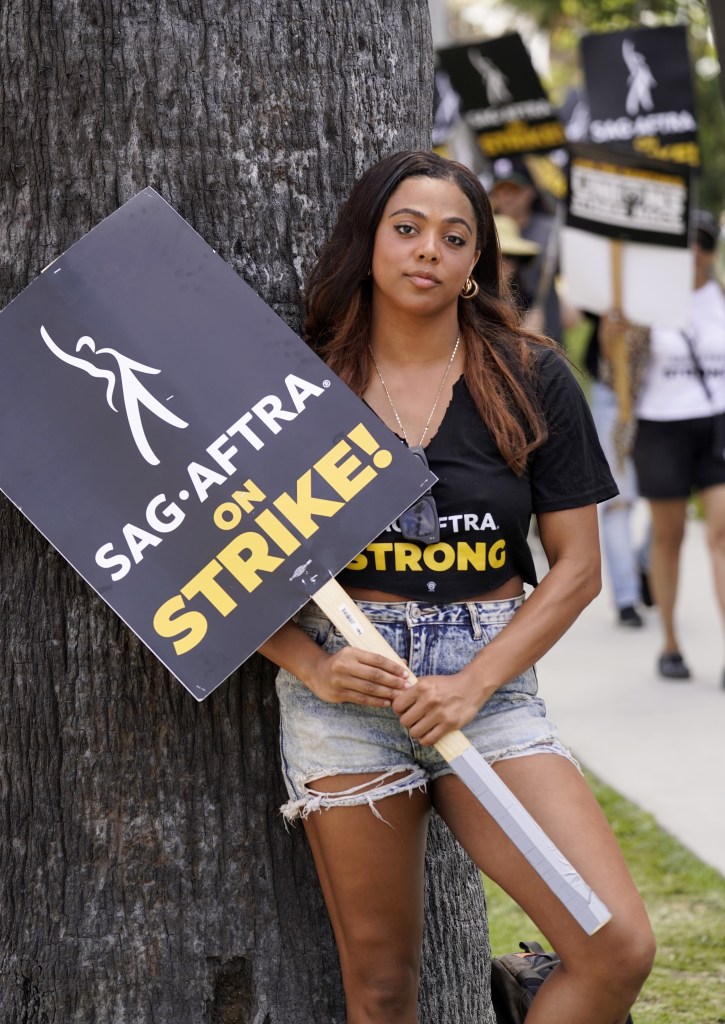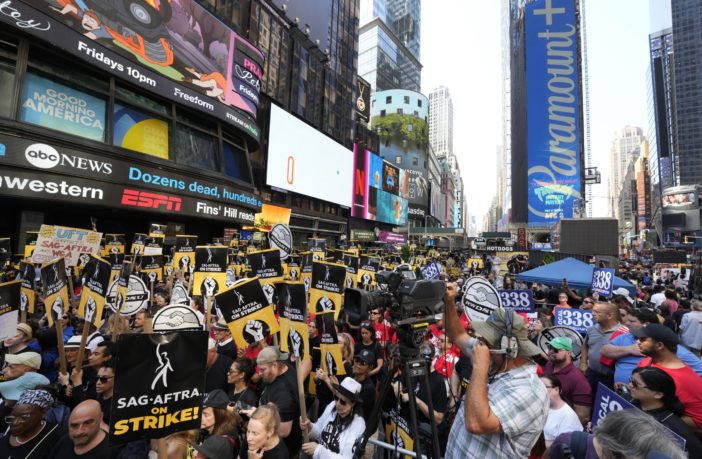By Megan Sayles,
AFRO Business Writer,
msayles@afro.com
Hollywood actors are battling the Alliance of Motion Picture and Television Producers (AMPTP) after contract negotiations came to no resolution in July. On July 14, SAG-AFTRA, which represents nearly 160,000 actors, dancers, stunt performers, voice over artists and other media professionals, went on strike.
This move came a little over two months after the Writers Guild of America (WGA) began its own strike with the AMPTP, which is still ongoing.
SAG-AFTRA’s primary demands for the AMPTP address fair wages and the use of artificial intelligence (AI) in films and television.
“Here’s the simple truth: we’re up against a system where those in charge of multibillion-dollar media conglomerates are rewarded for exploiting workers,” wrote SAG-AFTRA in a statement on July 17. “The companies represented by the AMPTP, which include Amazon/MGM, Apple, Disney/ABC/Fox, NBCUniversal, Netflix, Paramount/CBS, Sony, Warner Bros. Discovery (HBO) and others, are committed to prioritizing shareholders and Wall Street.”
The union is specifically asking for an 11 percent general wage increase in year one of the new contract to overcome the high inflation brought on by the COVID-19 pandemic and conflict in Ukraine. But AMPTP has offered a 5 percent increase, according to a SAG-AFTRA statement.
Although streaming platforms do pay residuals, or long-term compensation for reruns of TV shows and films, the amount is significantly less than those from broadcast TV. Performers want AMPTP to agree on a plan to ensure they receive their fair share of streaming revenue.
In a Deadline Hollywood guest column on July 19, Duncan Crabtree-Ireland, executive director and chief negotiator for SAG-AFTRA, said actors earned a median salary of $46,960 in 2021, while film and television studios make more than $12 billion each year.
Actor Wendell Pierce speaks during the SAG-AFTRA “Rock the City for a Fair Contract” rally in Times Square on July 25 in New York. The actors’ strike comes more than two months after screenwriters began striking in their bid to get better pay and working conditions. (Photo by Charles Sykes/Invision/AP)
“I’m an actor, and I have projects that are on streaming platforms right now, and some large corporations are benefiting and making billions off of it. This is the case with every actor right now,” said Maryam Basir, a member of SAG-AFTRA. “Content is being consumed almost exclusively on streaming platforms, and that’s caused a huge shift.”
Basir began professionally acting in 2020. She said some people overestimate how much money actors make. Although gross pay may seem high at the outset, performers lose money in taxes and have to give a percentage of their earnings to managers, agents, lawyers and publicists.
“A lot of us have families and children that we’re supporting. It’s just time to reevaluate things,” said Basir. “As technology advances and profits go up, the amount that everyone is making should also go up in a fair way.”
Chantal Maurice, a member of SAG-AFTRA, said she thinks streaming platforms exploit performers. She’s been acting since 2014 and highlighted the vital role residuals pay in keeping actors financially stable.
“I think the benefit of streaming is that it allows more people opportunities to book jobs and tell stories. However, residuals are very important to actors financially,” said Maurice. “For these companies to have this reach and not pay us our due when it comes to residuals is just sad. It makes me, as the talent, feel as though they don’t value the work that we, as actors, bring to their projects.”
Both Maurice and Basir have their own businesses to supplement their incomes in between acting jobs. Maurice owns CoStar Coaching, while Basir recently launched beauty brand, Maryam Beauty.
“It’s important for actors to diversify their income. I own an acting studio where I coach actors, but in addition to teaching them about the craft, I teach them about the business,” said Maurice. “Sometimes they (actors) say, ‘I don’t want to have a job, I want to be a full-time actor.’ I tell them that even though it’s a great goal, it doesn’t make them any less of an actor to have a nine-to-five job.”
 Actor Amari Dejoie poses for a portrait near SAG-AFTRA and WGA picket lines outside Netflix on July 21 in Los Angeles. (AP Photo/Chris Pizzello)
Actor Amari Dejoie poses for a portrait near SAG-AFTRA and WGA picket lines outside Netflix on July 21 in Los Angeles. (AP Photo/Chris Pizzello)
A major part of SAG-AFTRA’s strike involves the use of AI technology in film and television. The union claimed that AMPTP wants to scan background actors’ digital likeness and pay them for a half day’s work in order to use their image in future projects in perpetuity.
It also asserted that the alliance wants to use actors’ images, likenesses and performances to train AI technology without getting permission or providing pay.
AMPTP denied the first claim in a statement on July 13, writing: “The claim made by SAG-AFTRA leadership that the digital replicas of background actors may be used in perpetuity with no consent or compensation is false. In fact, the current AMPTP proposal only permits a company to use the digital replica of a background actor in the motion picture for which the background actor is employed. Any other use requires the background actor’s consent and bargaining for the use, subject to a minimum payment.”
AI has already been used in films and television for a number of years. Directors use the technology for visual effects and computer-generated images (CGI).
Paul Sluimers, founder and managing director of Revel AI, said he understands actors’ concerns about the technology, but he thinks the central problem is one of trust between actors and studios. His company uses AI to capture performers’ digital image and to create content for commercials and the broader entertainment industry.
“I think that the actors have a valid point. Clearly, they don’t feel like they have a good business relationship with the industry, so there is no trust. They’re afraid of not knowing how it’s going to be used,” said Sluimers. “I think they’re right that AI can be used in negative ways, but it could also be used in good ways for the industry. It shouldn’t be a tool to replace people.”
At this point, Sluimers said AI is not advanced enough to completely eradicate actors.
He explained that it can be employed to alter performers’ appearance so that they can appear younger or older when it’s required in a script. It can also be used for performers who want to book commercials but are too busy with other projects to be on-site for filming. Sluimers said this would create jobs for other stand-in actors.
In other cases, AI could be used when an actor dies in the middle of filming a project or series, so directors do not have to hire replacement talent.
“We just want to protect our likeness just to make sure that it’s not going to be used in any way without our permission and without compensation. As actors, our likeness is all that we have,” said Basir. “It’s how we represent ourselves. If someone can take that and use your likeness for whatever, that’s not right. I don’t agree with that.”
Editors note: As members of SAG-AFTRA, Chantal Maurice and Maryam Basir cannot publicize past, present and future projects under the union’s strike order.
Megan Sayles is a Report For America corps member.
Related Articles:



